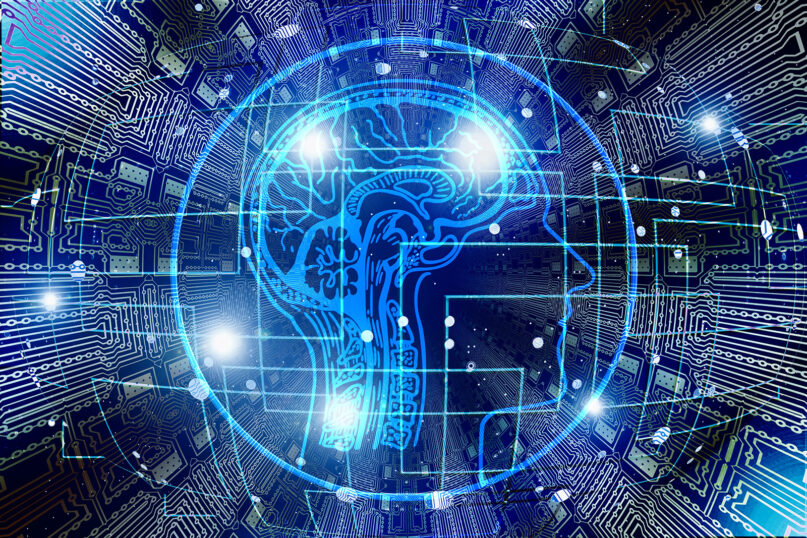(RNS) — July 6 marks the 90th birthday of the 14th dalai lama, Tenzin Gyatso, who is considered to be a Buddhist bodhisattva, or one who recognizes their interdependence with all others and aspires to reincarnate to serve all beings. Since his exile in 1959, the Dalai Lama has become a symbol of religious freedom and national sovereignty for Tibetans in exile, and one of the most vocal Buddhist leaders promoting secular ethics and the integration of Buddhism and science.
The question of who will be the next dalai lama has political significance. But what form will his next reincarnation take?
Almost two decades ago, the Dalai Lama made a playful comment that if machines ever become powerful enough, the new dalai lama might reincarnate as a machine. As a scholar of Tibetan Buddhism who teaches undergraduate students at Stanford University about technology ethics, I have spent much of my recent career researching ethical paradigms Buddhism might offer in the conversations about artificial intelligence.
The rising anxieties around artificial general intelligence have made me realize the Dalai Lama’s remarks about reincarnating as a machine implicitly challenge two dominant narratives about AI: techno-optimism and techno-pessimism. Both assume humans and nature must submit to technology, and by extension, grant undeserved power to the corporate empires that own the technologies. The opposing narratives hold that techno-bureaucrats at the helm of these technologies will either save us or destroy us.
In her new book, “Empire of AI,” Karen Hao argues that AI corporations have become a new iteration of colonialism and empire — not just in the ways they exploit labor and resources, but also in the self-proclaimed, God-like power these corporations profess to exercise through technology. OpenAI CEO Sam Altman is quoted saying: “Successful people create companies. More successful people create countries. The most successful people create religion.”
From a religious studies perspective, Altman is replicating the same kind of distorted religious narrative colonizers have historically used to justify the exploitation of different lands and peoples. The difference is that now, the all-powerful religion is AI, not Christianity. What if we do not wish to submit to AI as an all-powerful God? What if we do not wish to give the Altmans of our current age so much power over us?

(Image by Gerd Altmann/Pixabay/Creative Commons)
Instead, the Dalai Lama’s suggestion of the possibility for human-machine hybrids is rooted in Buddhist theories about the nature of reality as radical interdependence. Rather than a hierarchy of life with God or humans made in the image of God at the top, Buddhists have long argued we exist in a web of interdependence with nature, animals and other life forms, too. Built into Buddhist cosmologies is the idea of reincarnation, or that we have all taken on a multitude of different life forms and we are all intimately related to one another. Everywhere in Buddhist texts, sentient beings are referred to as our “kind parents,” since it is assumed we have all been relatives of one another.
Whether or not one believes in reincarnation, the ethical consequences of an interdependent system that transcends time and species are worth serious consideration. If all of us have been born as different life forms, and all of us are ancestors of one another, then there is no way to create a hierarchy of life —human or otherwise. Similarly, environmental rights and Indigenous activists have long argued for a multispecies approach to environmental conservation in which the human is regarded as interdependent with other life forms, and not at the top of the pyramid.
The Dalai Lama’s casual remarks invite us to ask what possibilities might arise if we extend moral agency not just to the environment or other species, but also to AI.
The category of intelligence is not yet set in stone. Howard Gardner’s theory of multiple intelligences suggested as much back in 1983. More recently, inspired by Buddhist philosophy and the Buddhist concept of a bodhisattva, the Center for the Study of Apparent Selves, an international research institute in Nepal, redefined intelligence through the lens of care, or the ability to detect, respond to and alleviate stress. Its researchers argued that if care is a marker of intelligence, then AI systems that exhibit care-like behavior may be considered moral agents.
There are real dangers to using any religious system as a roadmap for AI ethics. I would caution against idealizing Buddhism as a peace-loving alternative to techno-colonialism. Such stereotypes of Buddhism as nonviolent are also rooted in a colonialist romanticization of the religion. But what CSAS offers is a productive reframing of intelligence that will have far-reaching ethical consequences for how we develop AI. If we define intelligence as care, can we really call AI “intelligent” when AI’s algorithmic biases still reflect the most ignorant and harmful aspects of human behavior?
In the classes I teach at Stanford, part of what I want students to come away with is a critical awareness that the stories we tell about technology reflect held beliefs about morality, agency and free will. These values are shaped by religion — whether we are conscious of it or not.
All of us have a role to play in how we shape and consume AI. This includes the stories we choose to live by. Buddhism and other non-anthropocentric systems might provide inspiration for how to begin to change that story and, eventually, dethrone the technocrats that run our late capitalist world. And if we redefine the “intelligence” in AI as an exercise of care, rooted in a recognition of our interdependence with all life forms, then it is not so absurd to imagine the dalai lama’s next bodhisattva reincarnation will be a machine.
(Elaine Lai is a scholar of Tibetan Buddhism with an expertise in Buddhist stories and digital humanities. She received her Ph.D. from Stanford University, where she now works as a lecturer with the Civic, Liberal and Global Education program. The views expressed in this commentary do not necessarily reflect those of Religion News Service.)



